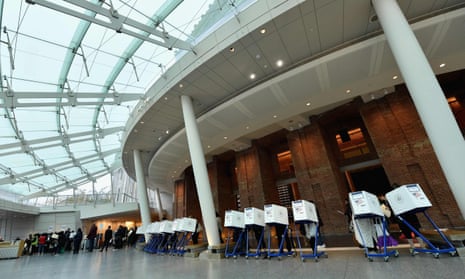New York City elections officials are scrambling to explain widespread voting failures during this month’s midterm elections, which sparked chaos at polling sites.
Ballot scanning machines broke down at poll sites around the city on 6 November, leaving some voters waiting in three-hour lines at some spots to get to a working scanner, and others forced to use emergency ballots.
“It is nothing short of a national embarrassment that a city so great runs its elections so poorly,” city councilman Ritchie Torres said at an oversight hearing on the breakdowns on Tuesday.
The failures in the city came amid voting problems across the country, as voters went to the polls in high numbers to vote in congressional and governor’s races. States like Georgia saw claims of deliberate voter suppression, while voters from Arizona to Florida found closed poll sites, long lines, or malfunctioning machines.
Michael Ryan, board of elections executive director for New York City, apologized to voters for the “clearly unacceptable” election day debacle.
The immediate culprit was a two-page, perforated ballot used in the city for the first time, he said. No other jurisdiction in the country uses two page ballots with perforated edges, required by New York state law, which cause paper jams.
It took nearly an hour on average to get each broken scanner back up and running, and lines piled up. Some sites with four or five scanners saw all of them break at the same time.
“There was an avalanche early in the morning, and we just could never catch up,” Ryan said, later telling reporters: “The frustration of the voters was real.”
Turnout surged in the city, with about 2 million voters casting ballots – double the number who did in the 2014 midterm elections. Pouring rain added to the chaos.
But it’s far from the first time New York City has botched an election. The problem goes beyond a poor ballot design: the elections board’s director and professional staff have no authority to make changes on their own. Decision-making authority lies with a board of commissioners, who by law are partisan appointees.
The party appointees also control hiring – leading to a long history of patronage and bureaucratic bungles.
New York also has some of the country’s most restrictive voting laws. It is one of 13 states that do not allow early voting, and voters can’t get an absentee ballot unless they have an excuse.
The city council speaker, Corey Johnson, who has called for Ryan’s resignation, called the administration of the election an “epic disaster” that could not be explained by a two-page ballot.
“This happens over and over and over again,” Johnson said.
“It is not putting a man on Mars. This should be doable,” he said. “There should not be riot conditions at poll sites.”
The new ballots underwent only brief testing with the machines, which did not replicate real-life conditions on election day. Poll workers did not receive additional training for the new ballots. Ryan said he knew by 6am, when polls opened, that “we were in trouble.”
Some voters left in frustration at the long lines and did not vote, the BOE chief acknowledged.
He was unable to say how many scanners actually broke down, but said BOE would station technicians at poll sites in the future to clear jams – if the board of commissioners approves it. He also hoped to enlist municipal workers to serve as poll workers.
After Democrats took control of the state senate, advocates are also planning a new push to reform the state’s voting laws and allow early voting. “We already have some of the most archaic and restrictive election laws in the country,” Johnson said. “It’s beyond urgent that we update our laws to catch up with the rest of the nation.”
